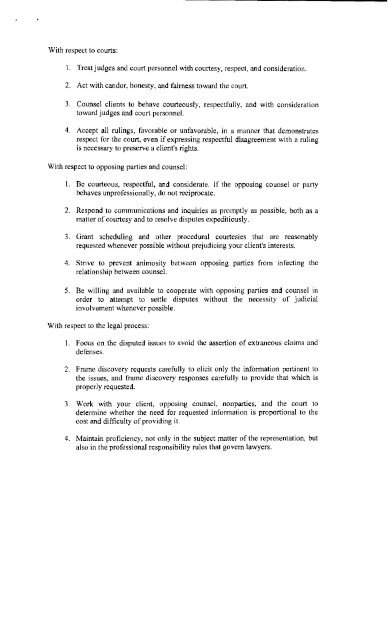2012 SC 82 - Kansas Judicial Branch
2012 SC 82 - Kansas Judicial Branch
2012 SC 82 - Kansas Judicial Branch
You also want an ePaper? Increase the reach of your titles
YUMPU automatically turns print PDFs into web optimized ePapers that Google loves.
With respect to courts:<br />
1. Treat judges and court personnel with courtesy, respect, and consideration.<br />
2. Act with candor, honesty, and fairness toward the court.<br />
3. Counsel clients to behave courteously, respectfully, and with consideration<br />
toward judges and court personnel.<br />
4. Accept all rulings, favorable or unfavorable, in a manner that demonstrates<br />
respect for the court, even if expressing respectful disagreement with a ruling<br />
is necessary to preserve a client's rights.<br />
With respect to opposing parties and counsel:<br />
1. Be courteous, respectful, and considerate. If the opposing counsel or party<br />
behaves unprofessionally, do not reciprocate.<br />
2. Respond to communications and inquiries as promptly as possible, both as a<br />
matter of courtesy and to resolve disputes expeditiously.<br />
3. Grant scheduling and other procedural courtesies that are reasonably<br />
requested whenever possible without prejudicing your client's interests.<br />
4. Strive to prevent animosity between opposing parties from infecting the<br />
relationship between counsel.<br />
5. Be willing and available to cooperate with opposing parties and collilsel in<br />
order to attempt to settle disputes without the necessity of judicial<br />
involvement whenever possible.<br />
With respect to the legal process:<br />
1. Focus on the disputed issues to avoid the assertion of extraneous claims and<br />
defenses.<br />
2. Frame discovery requests carefully to elicit only the information pertinent to<br />
the issues, and frame discovery responses carefuJiy to provide that which is<br />
properly requested.<br />
3. Work with your client, opposing counsel, nonparties, and the court to<br />
determine whether the need for requested information is proportional to the<br />
cost and difficulty of providing it.<br />
4. Maintain proficiency, not only in the subject matter of the representation, but<br />
also in the professional responsibility rules that govern lawyers.
















